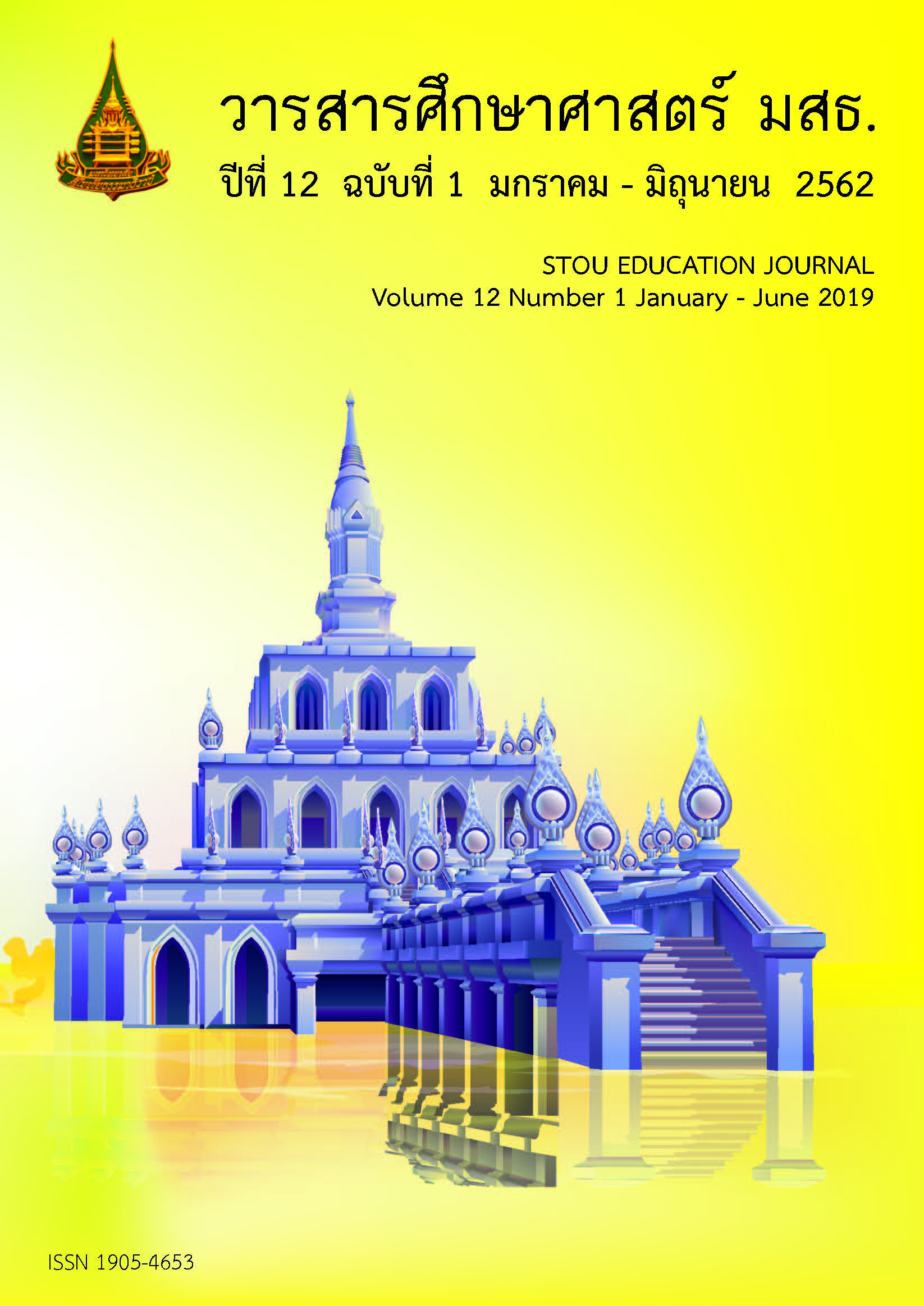ผลการใช้ชุดกิจกรรมแนะแนวแบบบูรณาการเพื่อพัฒนาการให้อภัย ของนักเรียนวัยรุ่นตอนต้น
Main Article Content
บทคัดย่อ
การวิจัยนี้มีวัตถุประสงค์เพื่อ 1) ศึกษาองค์ประกอบของการให้อภัยของนักเรียนวัยรุ่นตอนต้น และ
2) สร้างและประเมินผลชุดกิจกรรมแนะแนวแบบบูรณาการเพื่อพัฒนาการให้อภัยของนักเรียนวัยรุ่นตอนต้น การดำเนินการวิจัย แบ่งออกเป็น 2 ระยะ คือ (1) การศึกษาองค์ประกอบของการให้อภัย ผู้ให้ข้อมูล ได้แก่ ผู้ทรงคุณวุฒิ 4 คน และกลุ่มตัวอย่าง ได้แก่ นักเรียนระดับชั้นมัธยมศึกษาปีที่ 1-3 จำนวน 520 คน เครื่องมือวิจัย ได้แก่ แบบสัมภาษณ์ และแบบวัดการให้อภัย ( 2) การสร้างและประเมินผลการใช้ชุดกิจกรรมแนะแนว ผู้ให้ข้อมูล ได้แก่ ผู้ทรงคุณวุฒิ 3 คน กลุ่มตัวอย่าง ได้แก่ นักเรียนชั้นมัธยมศึกษาปีที่ 1-3 จำนวน 93 คน ได้มาโดยการสุ่มแบบกลุ่ม และสุ่มเข้าเป็นกลุ่มทดลองและกลุ่มควบคุม เครื่องมือวิจัย ได้แก่ แบบพิจารณาคุณภาพชุดกิจกรรมแนะแนว และแบบวัดการให้อภัย สถิติที่ใช้ในการวิเคราะห์ข้อมูล ได้แก่ ร้อยละ ค่าเฉลี่ย ส่วนเบี่ยงเบนมาตรฐาน การวิเคราะห์องค์ประกอบเชิงยืนยัน และการทดสอบค่าที ผลการวิจัย พบว่า 1) องค์ประกอบการให้อภัยของนักเรียนวัยรุ่นตอนต้น มี 3 องค์ประกอบ คือ (ก) ด้านความคิดเกี่ยวกับการให้อภัย ข) ด้านอารมณ์ความรู้สึกเกี่ยวกับการให้อภัย และ (ค) ด้านพฤติกรรมเกี่ยวกับการให้อภัย โดยองค์ประกอบการให้อภัยมีความเหมาะสมพอดีกับข้อมูลเชิงประจักษ์ ซึ่งทั้งสามองค์ประกอบมีน้ำหนักองค์ประกอบอยู่ในเกณฑ์สูง อย่างมีนัยสำคัญทางสถิติที่ระดับ .01 และ 2) ชุดกิจกรรมแนะแนวแบบบูรณาการ ประกอบด้วยกิจกรรมที่สามารถพัฒนาการให้อภัยได้ครบทั้ง
3 องค์ประกอบ จำนวน 11 กิจกรรม และผลการประเมินชุดกิจกรรมแนะแนวแบบบูรณาการเพื่อพัฒนาการให้อภัยของนักเรียน พบว่า หลังการทดลอง กลุ่มทดลองมีการให้อภัยสูงกว่าก่อนการทดลองอย่างมีนัยสำคัญทางสถิติที่ระดับ .05 และหลังการทดลอง กลุ่มทดลองมีการให้อภัยสูงกว่ากลุ่มควบคุมอย่างมีนัยสำคัญทางสถิติที่ระดับ .05
Article Details
เอกสารอ้างอิง
กรรณิการ์ ภุมรินทร์ และคณะ. (2553). มาเฟียเด็ก. สืบค้นจาก https://www.thairath.co.th/content/110198.
กษิรา เทียนส่องใจ. (2550). การศึกษาอภัยทานเพื่อขจัดการความขัดแย้งในสังคมไทยปัจจุบัน (วิทยานิพนธ์ปริญญามหาบัณฑิต ไม่ได้ ตีพิมพ์). มหาวิทยาลัยมหาจุฬาลงกรณราชวิทยาลัย, กรุงเทพฯ.
ปารมี ศรีบุญทิพย์. (2560). การวิเคราะห์องค์ประกอบเชิงยืนยันของการคิดเชิงระบบของนักเรียนชั้นมัธยมศึกษาปีที่ 1 โรงเรียนสาธิตมหาวิทยาลัยของรัฐ สังกัดสำนักงานคณะกรรมการการอุดมศึกษา. วารสารวิชาการ Veridian E-Journal, Silpakorn University, 10(3), 38-51.
พรรณพิศ จันทสุวรรณ. (2559). ผลการใช้ชุดกิจกรรมแนะแนวที่มีต่อคุณลักษณะอันพึงประสงค์ด้านอยู่อย่างพอเพียง ของนักเรียนชั้นมัธยมศึกษาปีที่ 1 โรงเรียนวัดหูแร่ จังหวัดสงขลา. วารสารศึกษาศาสตร์ มสธ., 9(2), 204-213.
ยุทธ ไกยวรรณ์. (2545). พื้นฐานการวิจัย. (พิมพ์ครั้งที่ 4). กรุงเทพฯ: สุวีริยาสาส์น.
สำราญ วงศ์ขวัญ. (2559). ผลการใช้ชุดกิจกรรมแนะแนวที่มีต่อการควบคุมตนของผู้ต้องขังเรือนจากลางบางขวาง. วารสารศึกษาศาสตร์ มสธ., 9(2), 285-293.
สำนักงานคณะกรรมการการศึกษาขั้นพื้นฐาน. (2560). ระบบสารสนเทศเพื่อการบริหารการศึกษา. สืบค้นจาก https://data.bopp-obec.info/emis/.
สมบัติ ตาปัญญา. (2550). เด็กไทยชอบรังแกติดอันดับ 2 ของโลก. สืบค้นจากhttp://www.komchadluek.net/2007/10/25/a001_165131.php? news_id=165131.
สมร ทองดี และปราณี รามสูตร. (2545). หน่วยที่ 9 แนวคิดในการพัฒนากิจกรรมแนะแนว. ใน ประมวลสาระชุดวิชาการพัฒนาเครื่องมือและกิจกรรมแนะแนว หน่วยที่ 9-15. นนทบุรี: สาขาวิชาศึกษาศาสตร์ มหาวิทยาลัยสุโขทัยธรรมาธิราช.
Enrignt, R.D. (2008). Forgiveness is a choice: A step-by-step process for resolving anger and restoring hope. US: APA LifeTools. American Psychological Association.
Enright, R.D. (1991). The moral development of forgiveness. In W. Kurtines & J. Gewirtz (Eds.), Handbook of Moral Behavior and Development (Vol. 1, pp. 123-152). Hillsdale, NJ, US: Lawrence Erlbaum Associates.
Enright, R.D., & Fitzgibbon, R.P. (2000). Helping clients forgive: An empirical guide for resolving anger and restoring hope. U.S.A.: American Psychological Association.
Enright, R.D., & Gassin, E.A. (1992). Forgiveness: A developmental view. Journal of Moral Education, 21(2), 99-113.
Gassin, E.A, Enright, R.D., & Knutson, J.A. (2005). Bringing peace to the Central City: Forgiveness education in Milwaukee Theory into practice. Peace Education, 44(4), 319-328.
Hepp-Dax, S.H. (1996). Forgiveness as an educational goal with fifth-grade inner-city children (Doctoral dissertation). Retrieved from https://fordham.bepress.com/dissertations/AAI9708250/.
Hui, E.K.P., & Ho, D.K.Y. (2004). Forgiveness in the context of developmental guidance: Implementation and evaluation. British Journal of Guidance & Counselling, 32(4), 477-492.
Tabachnick, B.G., & Fidell, L.S. (2001). Using multivariate statistics. USA: Allyn and Bacon.
Tang, S.S.C. (2014). An implementation and evaluation of the forgiveness education programmes based on process model and Chinese values with Hong Kong Chinese youth (Doctoral dissertation). Retrieved from http://hub.hku.hk/handle/10722/206659.


